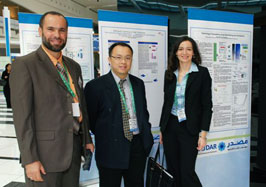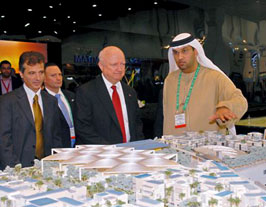“Masdar City will question conventional patterns of urban development, and set new benchmarks for sustainability and environment friendly design — the students, faculty and businesses located in Masdar City will not only be able to witness innovation first-hand, but they will also participate in its development.”
James L. Kirtley, Jr.,
Professor, Electrical Engineering and Computer Science
A VISION FOR THE FUTURE

For current information on the Masdar Institute and the Cooperative Program with MIT, visit: http://web.mit.edu/mit-mi-cp/index.html
Created in an atmosphere of true cooperation, TDP is working with The Masdar Institute to facilitate the development of human capacity in Abu Dhabi in the field of science and technology. As an essential component of The Masdar Initiative, the Masdar Institute is dedicated to the development of the critical thinking essential for the research-based science and technology infrastructure that will anchor the establishment of a new economic sector, dedicated to alternative and sustainable energy.
The Masdar Institute is a private, not-for-profit, research-driven university, governed by an independent Board of Trustees, which is chaired by His Royal Highness, Sheikh Mohamed bin Zayed Al Nahyan, the Crown Prince of Abu Dhabi.
Our work

TDP's role with the Masdar Institute is diverse and evolving, but currently is focused on four main areas: 1) development and management of joint collaborative research; 2) assistance in development of degree programs; 3) outreach that encourages industrial participation in Institute research and development activities; and 4) support for capacity building at the Institute in terms of its organizational and administrative structure as well as scholarly assessment of potential faculty candidates.
The Masdar Institute faculty, once chosen and appointed, spend up to one year working closely with faculty at MIT in Cambridge, Massachusetts in joint research projects on topics of relevance globally and to Abu Dhabi. The faculty also spend considerable time auditing the graduate-level classes they will eventually teach at the Masdar Institute.

The time that MIST faculty spend at MIT provides them with immersion in an environment of entrepreneurism and world-class research and education. It also, however, provides MIT faculty and students with the learning, knowledge, and perspectives garnered from a geographically diverse set of world-class MIST faculty members.
